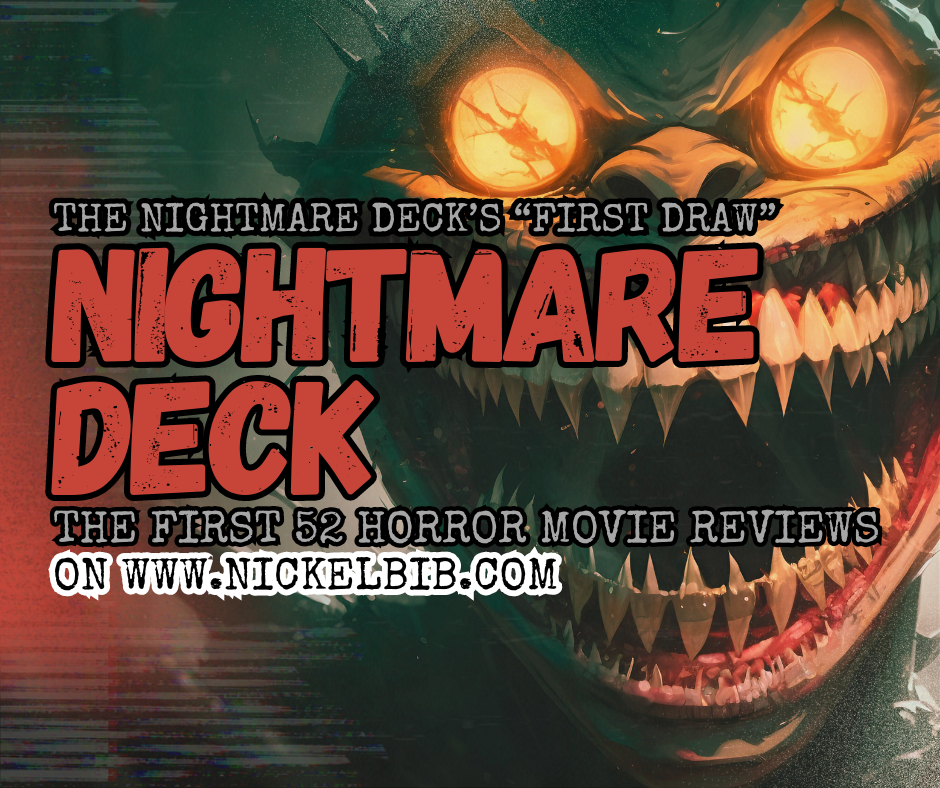I hadn’t heard of this film. For that reason and others, I think Censor is exactly the type of film I like to write about most on Nickelbib. As much as I did enjoy writing about Halloween Kills or A Quiet Place Part II earlier this year, it isn’t likely that I’ll persuade or dissuade anyone from seeing either film. They’re made-men, so to speak. Likewise, that excitement / thrill of discovery is lost on them. I’ve seen about a dozen Halloween’s by now and about one-hundred films inspired by Halloween, likewise, I’ll more-or-less know what to expect from the new Scream film when I watch that next month. The fun of finding a new, good horror film is a very satisfying endeavor, but it is also high-risk, high-reward. The batting average for how many “bad” low budget horror films I’ve seen paired against the good ones is not one for the major leagues.
Censor arrived sometime recently on the Hulu streaming service after a premiere at the Sundance Film Festival back in January. The film was directed by Prano Bailey-Bond in her directorial debut. The British psychological horror film stars Niamh Algar, an experienced actress who I was otherwise unfamiliar with (the 2016 Irish horror film Without Name is one I may be interested writing about sometime later on).
In Censor, Niamh portrays Enid Baines, an employee of the British Board of Film Classification. Her job is basically to watch a bunch of naughty films and decide what violent scenes should be cut from a film, as well as which films should be outright banned. The film is set in the mid-80s at the cusp of the Video Nasty controversy (I wrote a review of Cannibal Holocaust about a year back), and so, as you can imagine, she’s awful busy.
Back when Enid was a wee lass (because this is a British film), her sister Nina disappeared. Since then, Nina’s relationship with her parents has largely soured, with her mother and father wanting to declare that missing daughter as legally dead, once and for all, and move on with their lives. Nina, on the other hand, still holds out hope that her sister is missing and will one day be found. This all comes full circle when Enid sees a young woman featured in one of the Video Nasties that looks remarkably similar to her sister, and begins to investigate her suspicions, no matter the risk.
There is a lot to love about this film. Niamh Algar is a formidable lead, offering a strong performance, and, for the most part, serving as the glue that holds the whole thing together. Her character goes through a range of emotions over the course of the film, and, with her, it comes off very well. Likewise, the film is very skillfully crafted and thoughtful in the way it is shot. As you can imagine, Censor has a smaller budget, but, from the way it leans as a drama, it is allowed to get by on stylistic minimalism. Although you wouldn’t think it given the subject-matter of focusing on the carefree, blood-soaked realm of video nasties, the film feels both elegant and classical.
There’re aspects that do work against the film, although I think it will be dependent on perspective and your expectation heading into the film. The film can feel uneven and, even, at times, chaotic, but that was something I found I enjoyed better in-retrospect than as I watched the film. Simply because I had a fuller picture of the film’s intent. This is definitely more a psychological film than a horror, offering more focus on suspense and drama than any straightforward horror element. This doesn’t bother me in the least, but is something to keep in mind. Although it lends a lot of time on video nasties, Censor is largely the antithesis of that as a film.
At eighty-four minutes, Censor left me wanting more from it. This is both a compliment and a detriment. Sometimes for a film, I wonder what came first, the “ending” or the “story,” and, for some, I think you can often make an educated guess on that. Censor ends nicely, in such a way where I think the former may be true about it. It has that neat little sadistic bow to it that creates a finished product. At the same time though, it can almost feel like a copout. I found myself invested and immersed by the film, and with less than twenty minutes to spare, wondered how they’d be able to pay it all off. Which, they did, but they didn’t. As prefaced, I’m not saying it is a bad way to top off the film. Honestly, it’s a memorable conclusion that is consistent with the general vibe of the film. Still, I couldn’t shake the feeling that a lot of cards were left on the table by how abrupt it felt.
Censor offers some commentary on its subject-matter, as you’d likely expect.
This is a film about a woman who works at the British Board of Film Classification, after all. Surely, it’d have something to say about the content she focuses on. I liked this aspect of the film and how it was handled a lot.
The film offers credence to both sides of the argument, but doesn’t make a statement one way or the other, yet doesn’t feel like it is pulling its punches either. It isn’t preaching restrictions nor is it lampooning the ones who are, and instead, it offers a lesson that feels open to interpretation.
Censor is a strong directorial debut for Prano Bailey-Bond, a director whose work I look forward to seeing more of. Likewise, it is a nice feather in the cap of British horror and a film I would definitely recommend.






GIPHY App Key not set. Please check settings